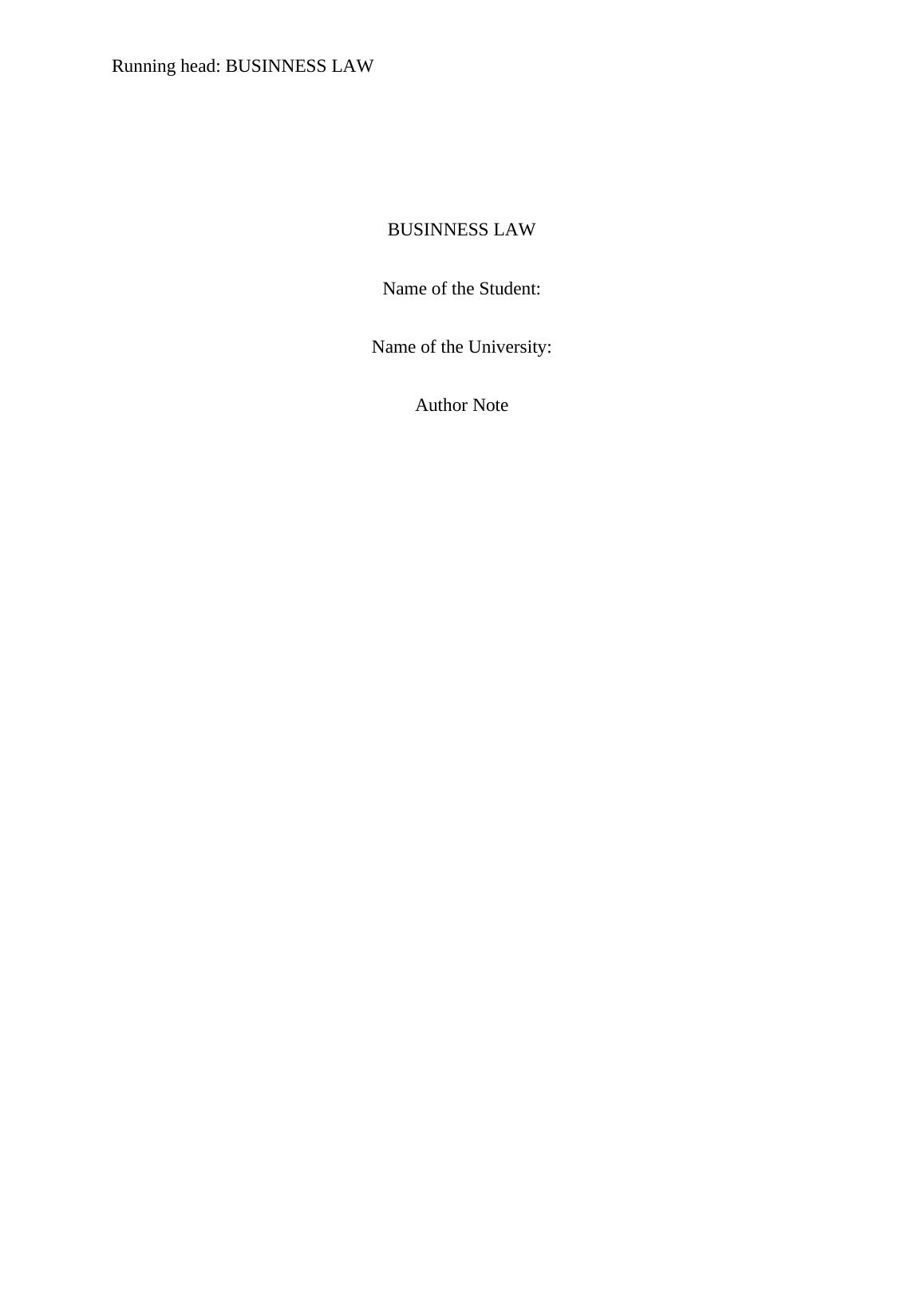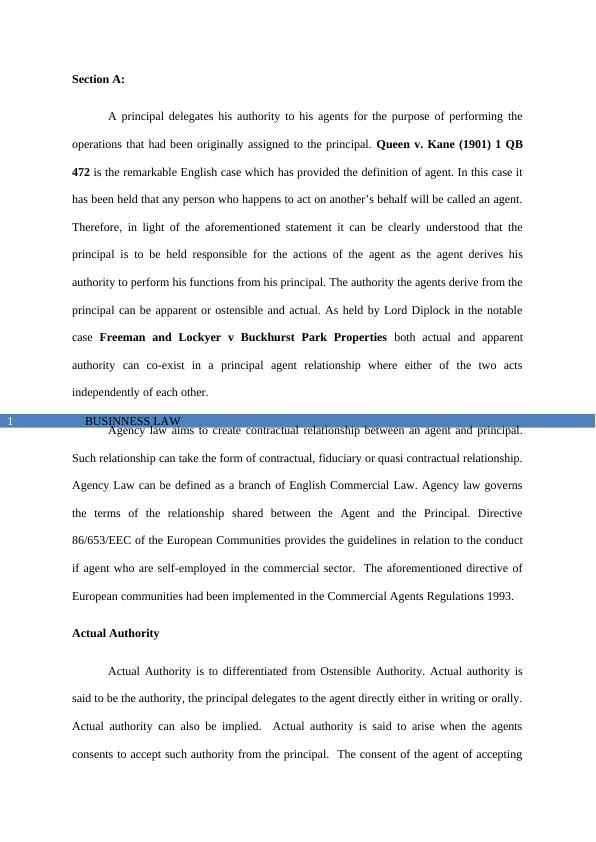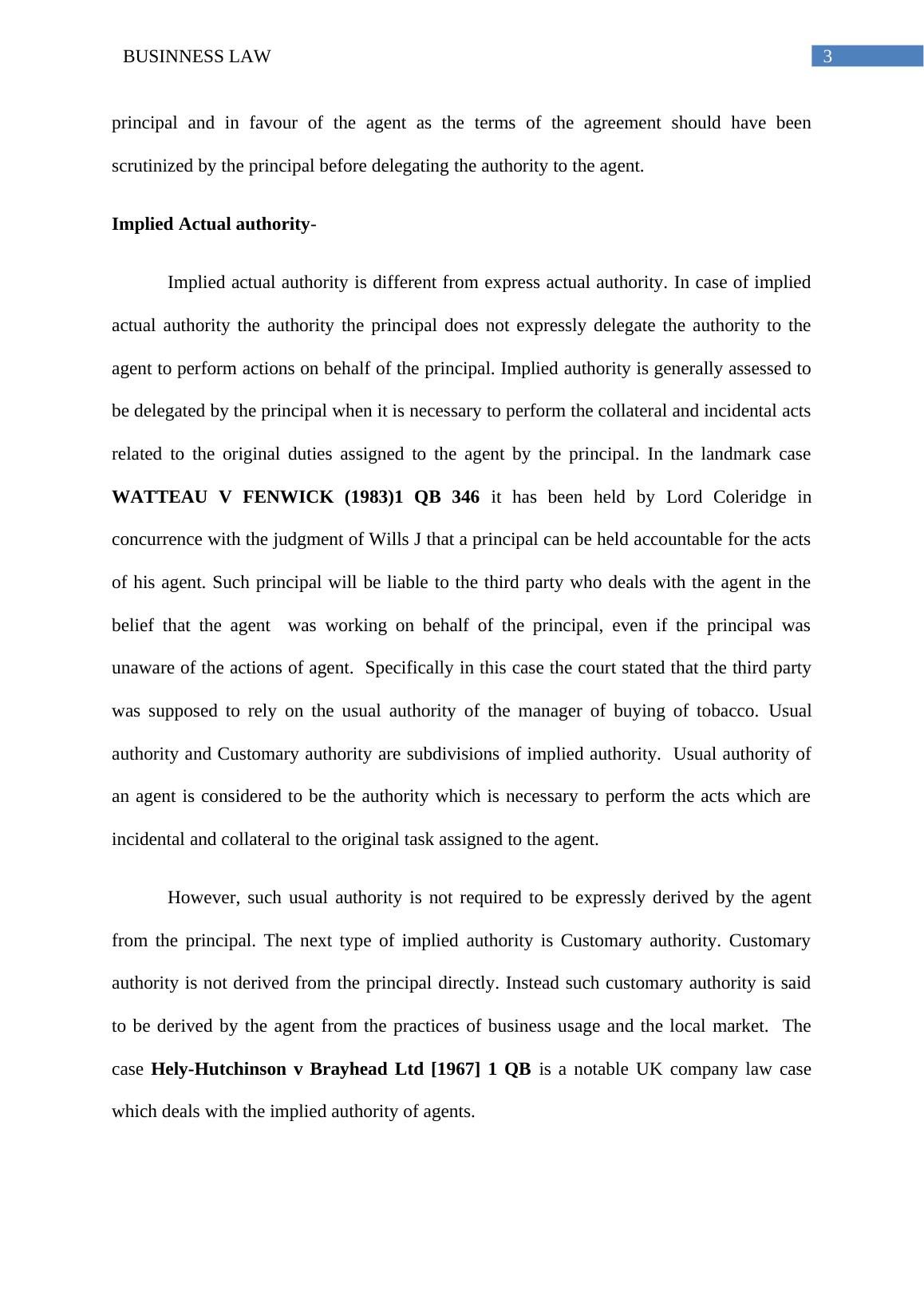Sample Business Law - Assignment
Added on 2021-04-17
11 Pages3025 Words297 Views
Running head: BUSINNESS LAWBUSINNESS LAWName of the Student:Name of the University:Author Note

BUSINNESS LAW1Section A:A principal delegates his authority to his agents for the purpose of performing theoperations that had been originally assigned to the principal. Queen v. Kane (1901) 1 QB472 is the remarkable English case which has provided the definition of agent. In this case ithas been held that any person who happens to act on another’s behalf will be called an agent.Therefore, in light of the aforementioned statement it can be clearly understood that theprincipal is to be held responsible for the actions of the agent as the agent derives hisauthority to perform his functions from his principal. The authority the agents derive from theprincipal can be apparent or ostensible and actual. As held by Lord Diplock in the notablecase Freeman and Lockyer v Buckhurst Park Properties both actual and apparentauthority can co-exist in a principal agent relationship where either of the two actsindependently of each other. Agency law aims to create contractual relationship between an agent and principal.Such relationship can take the form of contractual, fiduciary or quasi contractual relationship.Agency Law can be defined as a branch of English Commercial Law. Agency law governsthe terms of the relationship shared between the Agent and the Principal. Directive86/653/EEC of the European Communities provides the guidelines in relation to the conductif agent who are self-employed in the commercial sector. The aforementioned directive ofEuropean communities had been implemented in the Commercial Agents Regulations 1993.Actual Authority Actual Authority is to differentiated from Ostensible Authority. Actual authority issaid to be the authority, the principal delegates to the agent directly either in writing or orally.Actual authority can also be implied. Actual authority is said to arise when the agentsconsents to accept such authority from the principal. The consent of the agent of accepting

BUSINNESS LAW2the authority is considered to be factual evidence and cane be used in litigation processes. Aprincipal can be held responsible for the actions of his agent only if such agent acts with thescope of authority delegated to him. In circumstances when the agent exceeds his authority inperforming his action the principal cannot be he held liable. In such an instance, the act ofexceeding the authority to perform the action will be held to be in breach of contract termsand the agent will be personally liable to the third party with whom the agent had transacted.Actual authority can also be implied. Express actual Authority- Express authority is be said to be derived by the agent from the principal when theprincipal delegates the authority to the agent expressly either in writing or orally. Ireland vLivingstone (1872) LR 5 HL 395 is another notable English case, which deals with theprovisions of Express Authority. In relation to the Ireland vs Livingstone case it can be saidthat express authority arises from contractual agreements between the agent and the principal.As express authority can be delegated to the agent by the principal orally, the principal mustbe careful in choosing his word while communicating the agents to avoid anymiscommunication, which might make the agent, think that an agreement of agency has beenformed between the two, when such agreement was not intended to be formed by theprincipal. The agreement of agency will generally determine the agent’s extent of authority asdelegated to him by the principal. However, in case of oral agreements the evidence related toformation and terms and conditions of the agreement will determine the agent’s authority.The courts can assess the terms of the agency agreement if it is such agreement is found to beambiguous. However, in most cases the courts interpret the agreement of agency against the

BUSINNESS LAW3principal and in favour of the agent as the terms of the agreement should have beenscrutinized by the principal before delegating the authority to the agent. Implied Actual authority- Implied actual authority is different from express actual authority. In case of impliedactual authority the authority the principal does not expressly delegate the authority to theagent to perform actions on behalf of the principal. Implied authority is generally assessed tobe delegated by the principal when it is necessary to perform the collateral and incidental actsrelated to the original duties assigned to the agent by the principal. In the landmark caseWATTEAU V FENWICK (1983)1 QB 346 it has been held by Lord Coleridge inconcurrence with the judgment of Wills J that a principal can be held accountable for the actsof his agent. Such principal will be liable to the third party who deals with the agent in thebelief that the agent was working on behalf of the principal, even if the principal wasunaware of the actions of agent. Specifically in this case the court stated that the third partywas supposed to rely on the usual authority of the manager of buying of tobacco. Usualauthority and Customary authority are subdivisions of implied authority. Usual authority ofan agent is considered to be the authority which is necessary to perform the acts which areincidental and collateral to the original task assigned to the agent. However, such usual authority is not required to be expressly derived by the agentfrom the principal. The next type of implied authority is Customary authority. Customaryauthority is not derived from the principal directly. Instead such customary authority is saidto be derived by the agent from the practices of business usage and the local market. Thecase Hely-Hutchinson v Brayhead Ltd [1967] 1 QB is a notable UK company law casewhich deals with the implied authority of agents.

End of preview
Want to access all the pages? Upload your documents or become a member.
Related Documents
LST5CCL - Company and Commercial Law Assignmentlg...
|11
|3614
|104
Agency Relationships Assignmentlg...
|7
|1784
|37
Law of Agency Case Studylg...
|7
|1592
|55
Roles and Duties of Agents in Business Lawlg...
|10
|3930
|155
Business Law: Liability of an Agent and Agency by Necessitylg...
|6
|1211
|168
Application of Law Assignment pdflg...
|9
|2333
|254
